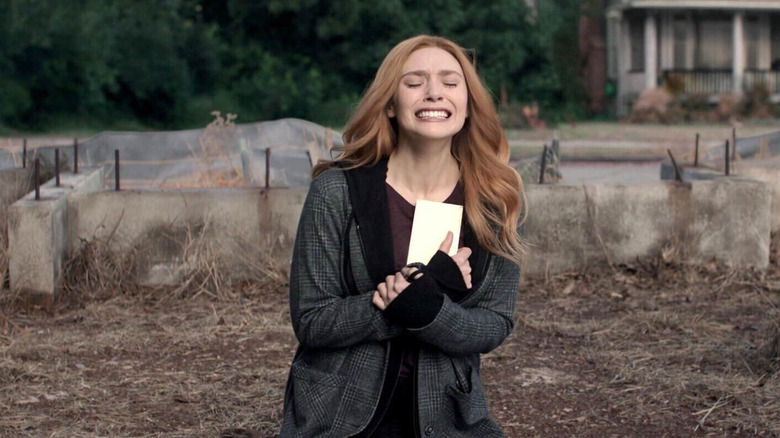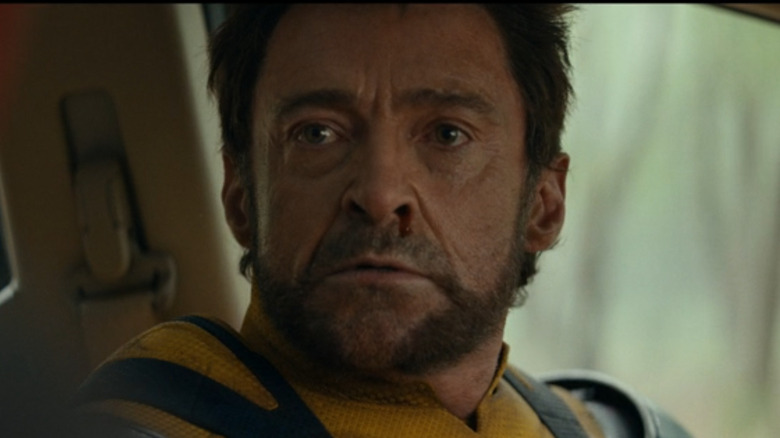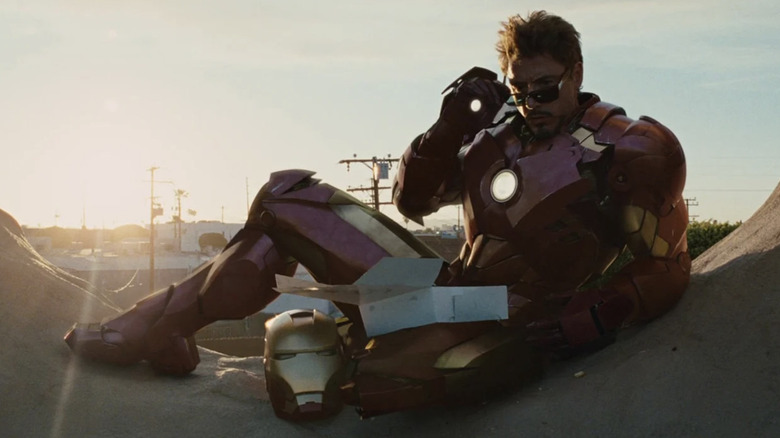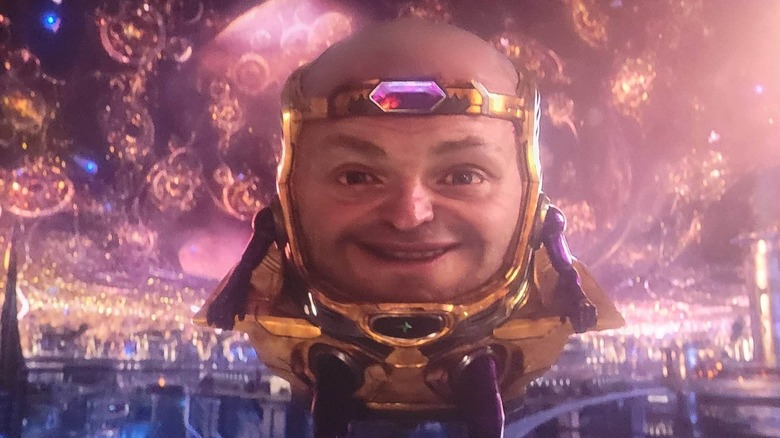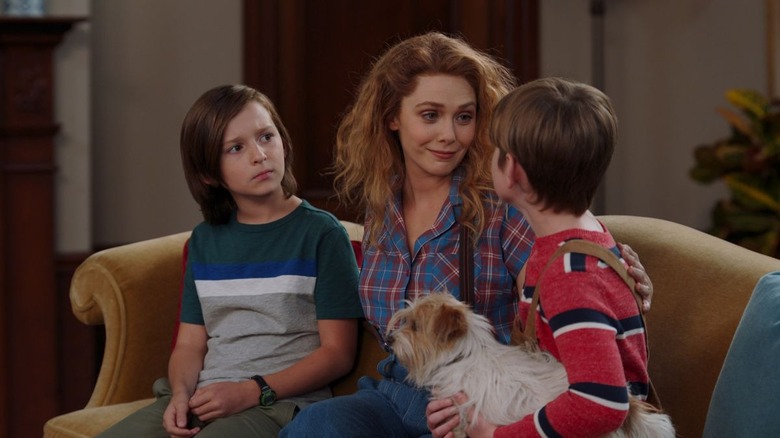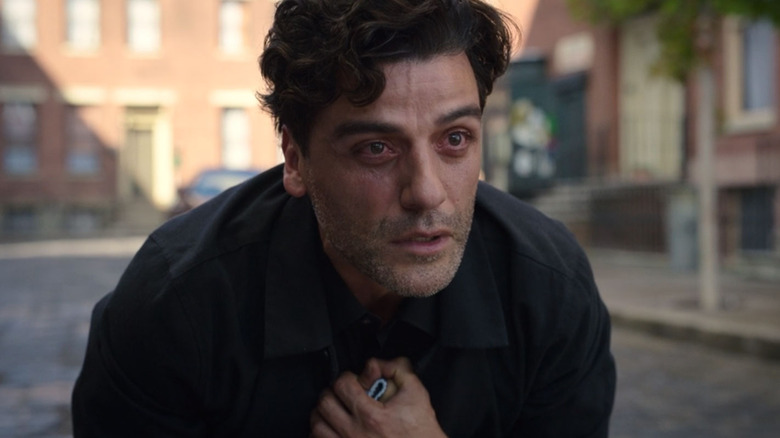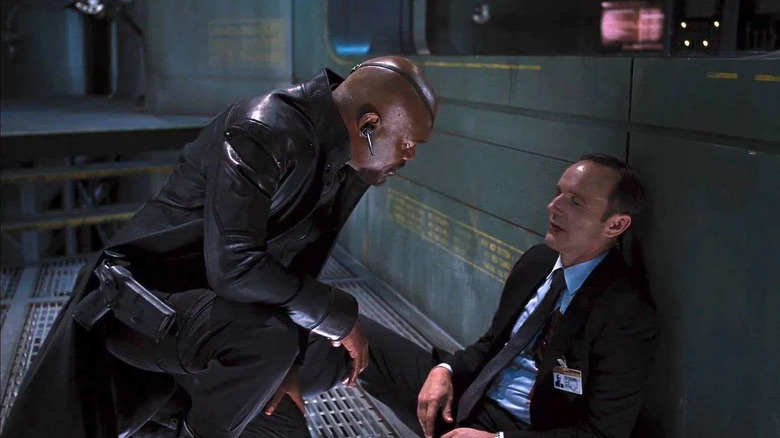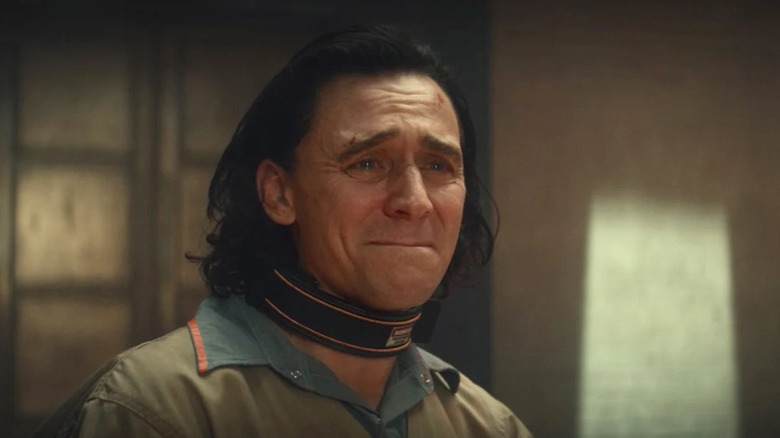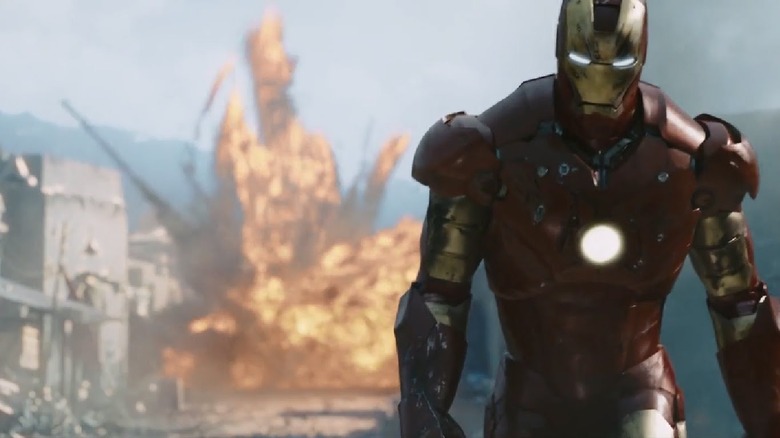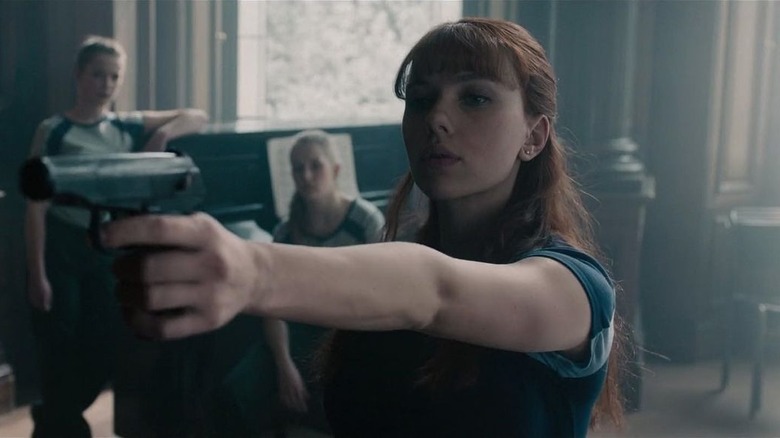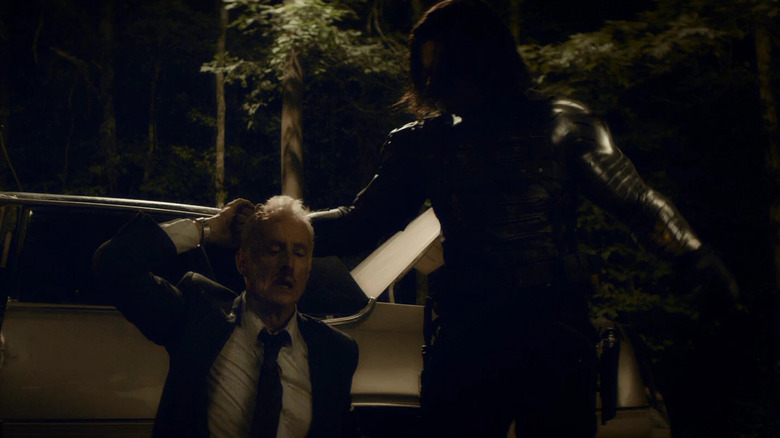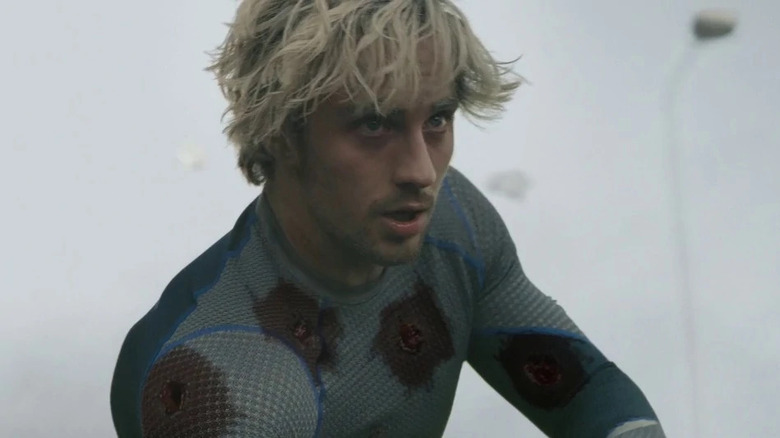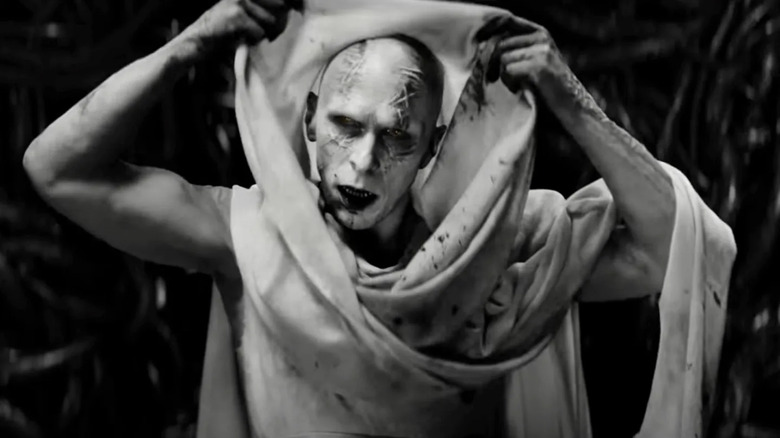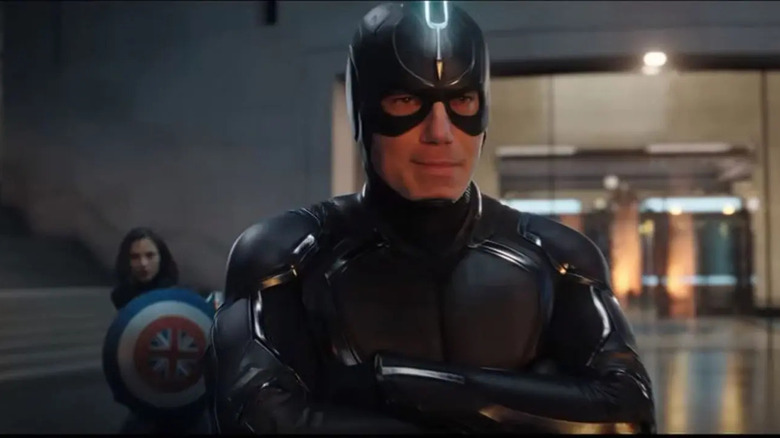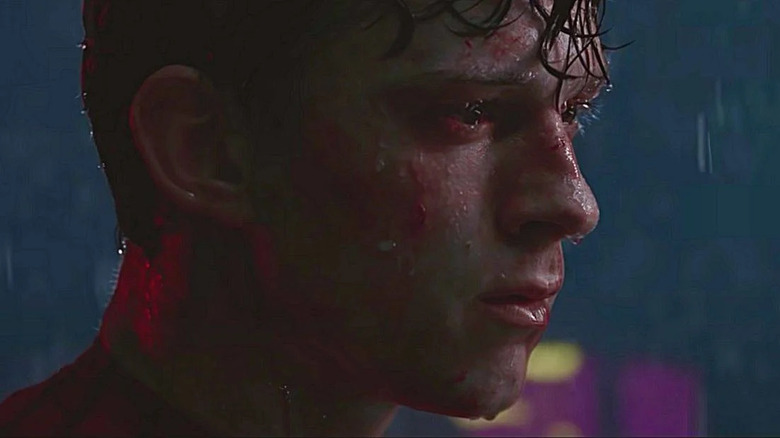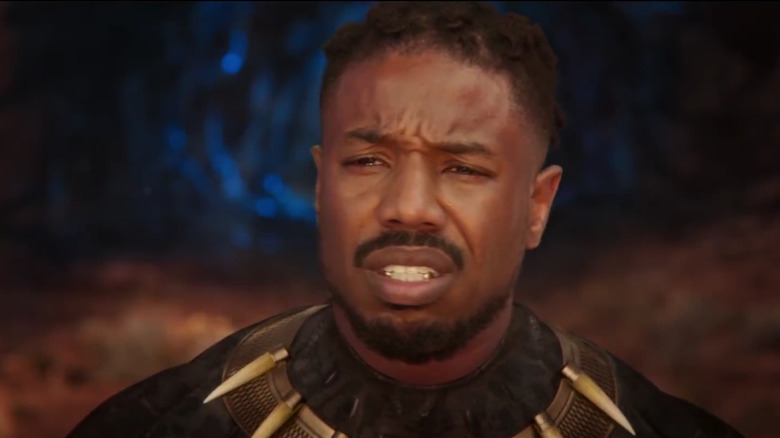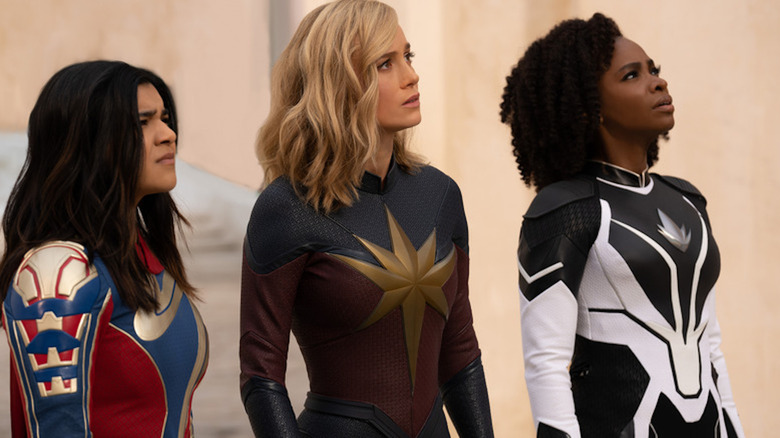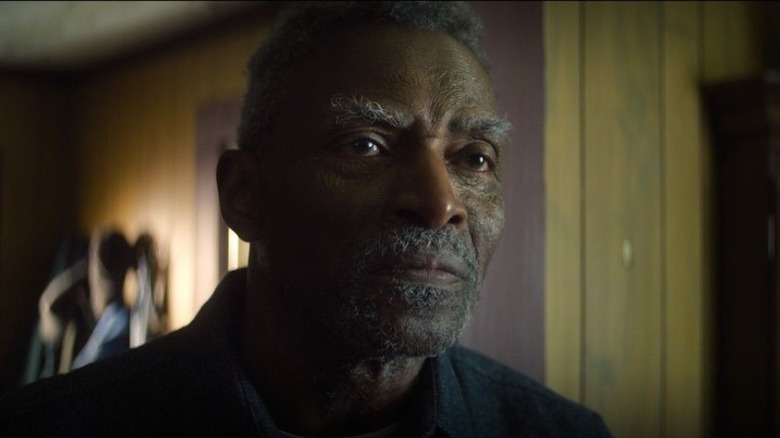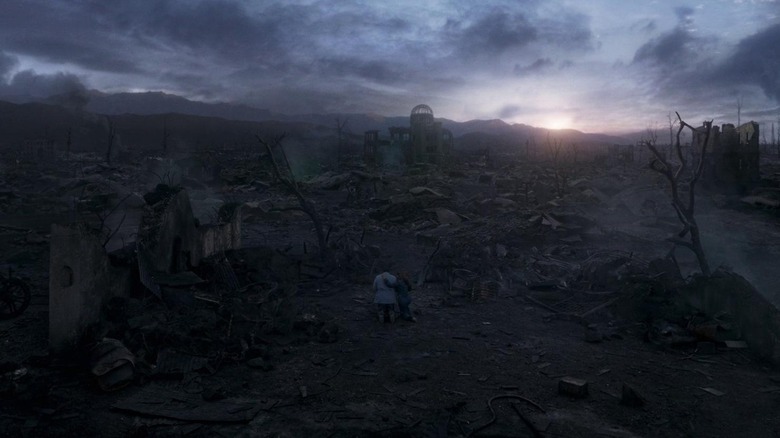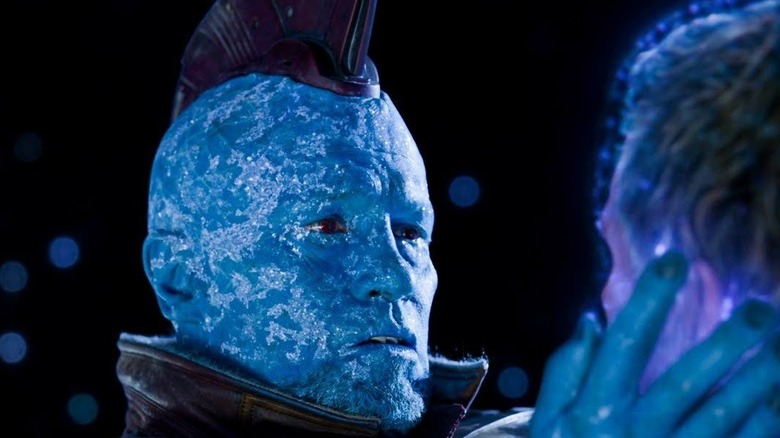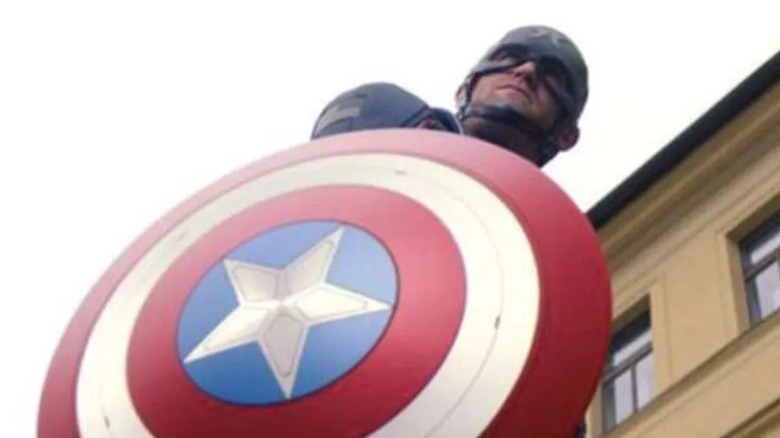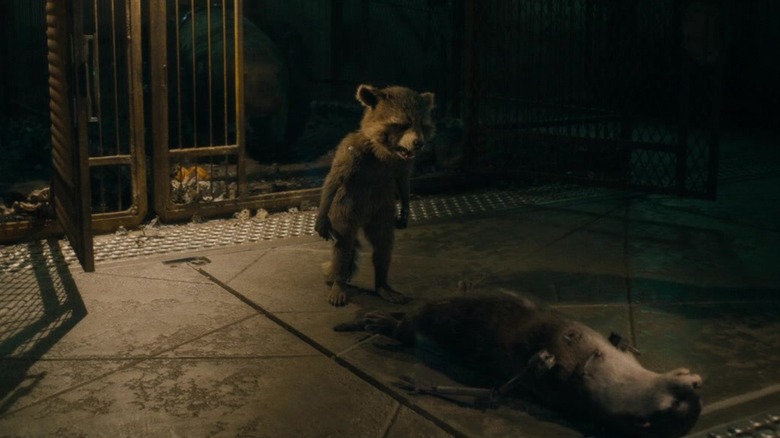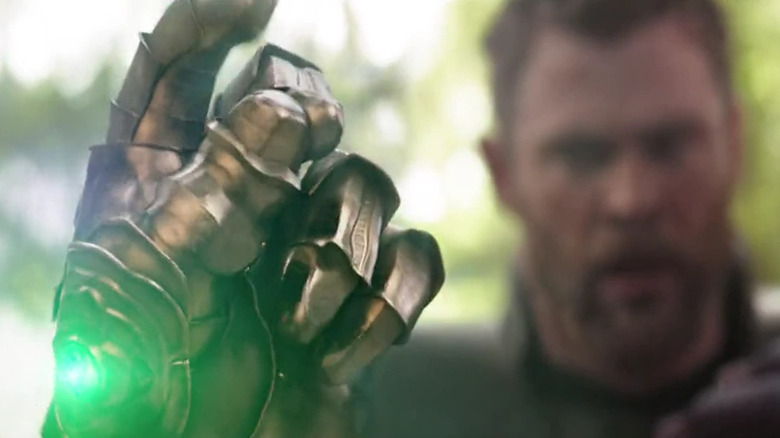The Most Brutal Moments In The MCU Ranked
The Marvel Cinematic Universe is one of the most consistently entertaining modern film franchises. One of the reasons that the MCU is so endearing is its sense of humor. Many of the Marvel films and shows feature the characters joking around and making pop culture references. This allows the universe to feel more relatable as if you are getting to know your friends. However, that doesn't mean that the MCU lacks the ability to get dark. If the characters don't face consequences for their decisions, then there isn't any reason that viewers should fear for their survival.
Some MCU projects are darker than others. You won't find a lot of brutality in the "Ant-Man" films or shows like "Hawkeye," because they are more comedic in nature. However, the darker storylines in the MCU have truly pushed the beloved characters to their breaking points. Here are the most brutal moments in the MCU, ranked.
22. Deadpool & Wolverine Have a Bloody Car Fight — Deadpool & Wolverine (2024)
There are a lot of brutal moments in "Deadpool & Wolverine," because, well, both characters lend themselves well to brutal moments. But there's nothing quite like their bloody all-out brawl in a 2011 Honda Odyssey. After Wolverine (Hugh Jackman) says the meanest things anyone could possibly say to Deadpool (Ryan Reynolds), the two nearly-unkillable superheroes do everything they can to kill one another. It's easily the bloodiest thing to ever happen in the MCU, especially since the movie is the first R-rated entry in the franchise, with both characters painting the inside of the car red with gore. If it were played totally seriously, it would probably be unsettling, but since it's set to "You're the One that I Want" from "Grease" (diegetically in the scene, no less, playing over the car's stereo) and Reynolds and Jackman both add in a fair bit of flirtation, the scene is a total blast. There's even a shot where the car is rocking as if the two were making passionate love, but they're just going at it in a very different manner of speaking. It's ridiculous, funny, vulgar, hard-hitting stuff that sets "Deadpool & Wolverine" apart from the rest of the MCU through sheer intensity... and a little bit of stupidity.
21. The Reviews for Iron Man 2 (2010)
One of the reasons that the MCU has been so successful is the consistency of quality. While some MCU films are better than others, the studio has yet to create an embarrassing disaster like "Batman & Robin" or "Steel." However, the MCU did make a few missteps early on. Although 2008's "Iron Man" was a game-changing success, the 2010 sequel was a major misfire. In order to capitalize on the success of the first film, "Iron Man 2" was rushed into production. It taught the MCU an important lesson, namely that there wasn't any point in making a sequel if the story is not well conceived first.
"Iron Man 2" was a major disappointment, especially since the first film remains one of the strongest entities in the MCU thus far. While Tony Stark's (Robert Downey Jr.) origin story felt like a breath of fresh air, "Iron Man 2" turned Tony into an unlikeable snob. Critics picked up on the disparity in quality. "Slate" described the first film as a "thinking man's blockbuster," but said that the sequel wasted the charisma of its lead actor. The "New York Post" critic Lou Lumenik blamed the convoluted story on co-screenwriter Justin Theroux, and referred to the subplots as "tedious." Even Roger Ebert, who liked the film overall, stated that the first two films "have essentially the same story arc."
20. The Unfortunate MODOK Visual Effects in Ant-Man & The Wasp: Quantumania (2023)
If we could ever get Kevin Feige in a room and inject him with truth serum (not that we're planning on doing that or anything), we'd bet he wishes he could use a mulligan on this one. Never mind that the ill-fated casting of Jonathan Majors as Kang has made so much of "Ant-Man and the Wasp: Quantumania" age poorly in the years since release, from its awkward Kang-centric credits tease that will never go anywhere now to the very notion that they tried establishing a new Thanos-level threat but let him get his butt kicked in his very first appearance by ... Ant-Man, of all characters. Setting all that real-world ugliness aside, there's one creative misstep that continues to haunt this movie more than any other.
That's right, we're talking about the horrifying visual effects monstrosity and meme-friendly punchline known as MODOK. Look, we get it: a fan-favorite comic supervillain who's basically just a giant, floating head is supposed to be a little goofy. That's the whole appeal here! That's still no excuse for the unfinished VFX or digitally stretching poor Corey Stoll's face over the entire width of the character to the point where "uncanny valley" just doesn't do it any justice. It certainly didn't help that Marvel tried so hard to keep MODOK hidden throughout the marketing and build him up as some game-changing surprise. Call us haters if you must but, once the reveal finally arrived, you could feel the oxygen leaving the room.
19. Wanda Loses Her Children — WandaVision (2021)
Few characters in the MCU have had to deal with as much hardship as Wanda Maximoff (Elizabeth Olsen). In 2015's "Avengers: Age of Ultron," Wanda reveals that she lost her parents at a young age. When she tries to help avert a crisis in 2016's "Captain America: Civil War," the attempted rescue goes horribly wrong, and the news media blame Wanda for the tragedy. Wanda's enduring perseverance has made her an inspiring character. Wanda finally got her own standalone story in the 2021 miniseries "WandaVision," the first Marvel show released on Disney+. In the beginning, "WandaVision" had a very comedic tone, and replicated the style of classic sitcoms. However, the miniseries steadily went in a much darker direction, revealing that Wanda's idealized life in the suburbs with her husband, Vision (Paul Bettany), is her way of coping with everything that she has endured.
Wanda imagines that she has two young children, Billy (Julian Hilliard) and Tommy (Jett Klyne). In "The Series Finale," Wanda's simulated reality vanishes and she once again has to lose her lover, her home, and her children, whom she has grown to deeply care for. Seeing Wanda suffer another tragedy was brutal to watch. As a result, Wanda becomes the primary antagonist in 2022's "Doctor Strange in the Multiverse of Madness." Some MCU fans felt that the shift in Wanda's characterization betrayed the backstory that "WandaVision" had established.
18. Marc Spector's Backstory — Moon Knight (2022)
The 2022 series "Moon Knight" presented an interesting challenge for the MCU. Unlike the other shows that were released on Disney+, "Moon Knight" is not centered on characters that have previously appeared in the MCU. The show had to develop a compelling backstory for Marc Spector (Oscar Isaac), a mercenary who gains superpowers from an ancient Egyptian god. Marc suffers from dissociative identity disorder, and the show often presents things from his perspective. As a result, it is not until later within the series that Marc's complete backstory is revealed.
Marc's other personality, Steven Grant, is a cautious retail worker. The first few episodes primarily focus on Steven, but the character constantly experiences shifts in his identity. In the fifth episode, "Asylum," Marc realizes that he created the persona of Steven to cope with a tragedy within his past. When he was young, Marc's brother, Randall (Claudio Fabian Contreras), drowned to death. Marc's mother blamed him for the tragedy and subjected him to emotional abuse throughout his childhood. Watching Marc lose his brother was brutal enough, but seeing him receive no comfort made the emotional wound even more devastating.
17. Agent Phil Coulson Is Stabbed — The Avengers (2012)
There isn't another MCU death that is more important than the loss of Phil Coulson (Clark Gregg) in 2012's "The Avengers." The death of the beloved S.H.I.E.L.D. agent at the hands of Loki (Tom Hiddleston) inspires the Avengers to start working together. Even though Coulson is ultimately revived in the ABC spinoff series "Agents of S.H.I.E.L.D.," his death is still tough to watch. Coulson had been a likable character throughout the first phase and helped introduce each character to the larger universe that they are all living in.
Coulson is one of the best parts of "The Avengers." Gregg's sense of humor added levity to the story, particularly when Loki's schemes grew frightening. Coulson is excited to meet Steve Rogers (Chris Evans), as he has been a fan of Captain America for his entire life. He draws inspiration from Steve and decides to stand up to Loki when he escapes confinement, but Loki stabs him in the back. Coulson is left bleeding out, dying. When Nick Fury (Samuel L. Jackson) comes to his aid, Coulson tells him that the entire endeavor would have been pointless if the superheroes did not have "something to avenge."
16. Loki Watches His Life Unfold — Loki (2021)
Loki is one of the most complex characters within the MCU. In 2011's "Thor," Loki's dilemma is sympathetic, as he grew up thinking that Odin (Anthony Hopkins) is his father, but realizes that he was adopted. Loki's biological father is the Frost Giant Laufey (Colm Feore). Loki ultimately turns into a fearsome villain in 2012's "The Avengers," but over the course of the franchise, he is redeemed. Loki becomes an ally to his adopted brother Thor (Chris Hemsworth) in 2013's "Thor: The Dark World" and 2017's "Thor: Ragnarok."
In 2018's "Avengers: Infinity War," Loki is killed when he tries to stand up to Thanos (Josh Brolin). However, a variant of Loki manages to escape into a different reality in 2019's "Avengers: Endgame." The variant Loki is not sent back to prison on Asgard, but is captured by minutemen and imprisoned by the Time Variance Authority in the 2022 series "Loki." The TVA shows him what his potential future had in store, and Loki watches all the tragedy and heartbreak that his alternate self experienced. This scene is one of the most emotionally devastating moments in the entire MCU. Even at their darkest, the MCU films and shows have shown a sense of optimism about what the future has in store. However, Loki receives confirmation that his life will amount to nothing. It is completely understandable why Loki goes through an existential crisis in the aftermath of these revelations.
15. The Village Raid — Iron Man (2008)
The original "Iron Man" is a very different film from the rest of the MCU, as Paramount Pictures produced it. While the films got progressively more comedic when the rights were sold to the Walt Disney Company, "Iron Man" is relatively gritty. It was also a film that was released during the end of U.S. President George Bush's administration. The crisis in the Middle East dominated news headlines, and as a result, "Iron Man" served as a commentary on the arms race and modern terrorism. Tony would ultimately have to face off against aliens and supervillains in the later films, but none of those characters are quite as terrifying as the real-world threats that he goes up against in his origin story.
After escaping from imprisonment, Tony begins experimenting with the new technology that he has developed. When he attends a charity event for Stark Industries, Tony learns that his own company's technology has been used by terrorists in Afghanistan to attack an innocent village. The revelation is even more devastating for Tony when he realizes that the village is the home of Ho Yinsen (Shaun Toub), the man who helped him escape. While the depiction of realistic acts of terrorism is disturbing, it is important within the context of Tony's character arc. Only after seeing what his technology is capable of does Tony decide to fly to Afghanistan in the Iron Man suit.
14. Black Widow's Training — Black Widow (2021) and Avengers: Age of Ultron (2015)
Natasha Romanoff (Scarlett Johansson) was shrouded in secrecy throughout her first few appearances in the MCU. Following the raid on Sokovia in 2015's "Avengers: Age of Ultron," Wanda Maximoff uses her powers to expose each of "The Avengers" to traumatizing moments from their past. It's during these nightmare sequences that Natasha has to relive her training at the Red Room Academy. During her "graduation ceremony," Natasha is sterilized. She tells Bruce Banner (Mark Ruffalo) that she considers herself to be a "monster."
The depiction of female bodily autonomy sparked controversy, as some MCU fans felt that writer/director Joss Whedon handled it improperly. However, Natasha's childhood was explained in more depth in the 2021 film "Black Widow," which chronicles her adventures between the events in "Captain America: Civil War" and "Avengers: Age of Ultron." This time, Natasha's story was told by a female director. "Black Widow" director Cate Shortland explored the disturbing moments from Natasha's past, including how she escaped from the Red Room. While the training scenes are tough to watch, "Black Widow" at least ended on a positive note as Natasha is able to save some of the other trainees from similar fates.
13. The Winter Soldier Kills The Starks — Captain America: Civil War (2016)
The presumed death of Bucky Barnes (Sebastian Stan) in 2011's "Captain America: The First Avenger" was a shocking moment, but it was critical within Steve Rogers' character arc. Steve was forced to watch his best friend lay down his life in combat, which taught him the power of self-sacrifice. When Bucky reemerges in 2014's "Captain America: The Winter Soldier," Steve does everything within his power to restore his best friend's memories. Steve's loyalty to Bucky has no limits: Even after Bucky is blamed for a political assassination in 2016's "Captain America: Civil War," Steve is desperate to clear his name.
Although Steve knows that Bucky has done horrible things because he was brainwashed, one of Bucky's crimes personally affected a member of the Avengers team. When Steve, Tony, and Bucky confront the villain Zemo (Daniel Brühl), it is revealed that Bucky is responsible for the death of Tony's parents, Howard (John Slattery) and Maria Stark (Hope Davis). Tony is shocked by the revelation. While he was never close with his father, he isn't prepared to see the brutal footage of Bucky's remorseless attack. Tony grows furious at Steve for not telling him the truth, which makes the scene both emotionally and viscerally disturbing. Bucky's assault is violent in a realistic way. However, the moment becomes truly heartbreaking due to Downey Jr.'s incredible performance, where Tony sets aside logic and attacks Bucky and Cap out of blind rage.
12. Quicksilver's Death — Avengers: Age of Ultron (2015)
The MCU has not always handled death well. In a universe where characters are revived or brought back through the multiverse, it becomes less impactful whenever someone supposedly meets their demise. Why is it worth mourning them if they can just be revitalized? However, 2015's "Avengers: Age of Ultron" managed to kill off one character for good when the speedster Pietro Maximoff (Aaron Taylor-Johnson) is shot to death to save Clint Barton (Jeremy Renner) and a young child from gunfire during their battle with Ultron.
Although "Age of Ultron" was Taylor-Johnson's first appearance in the MCU (outside of a brief cameo during the post-credit scene in "Captain America: The Winter Soldier"), Pietro was an instantly likable character. He shows a strong loyalty to his sister, Wanda, and adds some fun banter to the group once he joins the Avengers in their mission. Pietro gives one last quip before he collapses, which makes the moment even sadder.
11. Gorr's Backstory — Thor: Love and Thunder (2022)
"Thor: Love and Thunder" is one of the goofiest films in the MCU thus far. Between the wacky voiceovers by the alien Korg (Taika Waititi), the use of romantic comedy framing devices, and the silly lead performance from Hemsworth, "Thor: Love and Thunder" is just as much a comedy as it is an action film. The lighter tone makes the darker elements stand out even more, especially since the main antagonist Gorr (Christian Bale) has a very tragic backstory revealed in the opening scene.
Gorr seeks the assistance of his god Rapu (Jonny Brugh) in order to save his young daughter. Rapu merely mocks him after Gorr is forced to watch his daughter die in his arms. It is a devastating moment, as not only does hGorr lose the person he loves the most but realizes that his faith in the gods was misplaced. The best MCU villains are the ones that have compelling motivations, and it makes sense that Gorr would take on the moniker "The God Butcher" to slay all of the divine beings that have been cruel to their followers.
10. Wanda Kills The Illuminati — Doctor Strange in the Multiverse of Madness (2022)
MCU fans have come to expect exciting cameos in each new film. "Doctor Strange in the Multiverse of Madness" includes many surprise appearances when Stephen Strange (Benedict Cumberbatch) visits Earth-838. Sorcerer Supreme Karl Mordo (Chiwetel Ejiofor) introduces him to the Illuminati, an elite group of the universe's most powerful characters: Dr. Reed Richards/Mr. Fantastic (John Krasinski), Captain Peggy Carter (Hayley Atwell), Captain Marvel/Maria Rambeau (Lashana Lynch), Blackagar Boltagon/Black Bolt (Anson Mount), and Professor Charles Xavier (Patrick Stewart).
Seeing this collection of characters appear in quick succession was thrilling, but the Illuminati certainly does not last for very long. A possessed Wanda arrives on Earth-838 and attacks the group, and each member of the Illuminati is killed in an increasingly cruel way. It was shocking to see these characters that were just briefly introduced killed off so quickly and savagely.
9. Aunt May's Death — Spider-Man: No Way Home (2021)
The 2017 solo movie "Spider-Man: Homecoming" felt like a breath of fresh air compared to previous incarnations of the character. One of the issues with 2012's "The Amazing Spider-Man" was that it felt way too similar to 2002's "Spider-Man." "Spider-Man: Homecoming" did not repeat the same mistake, and began its story once Peter Parker (Tom Holland) had already been saving people as Spider-Man for a while. This meant that the MCU never had to depict the death of Peter's Uncle, Ben Parker.
It was unclear if Peter would ever have to experience a similar tragic moment until 2021's "Spider-Man: No Way Home." In this incarnation of the character, Peter witnesses the death of his aunt, May Parker (Marisa Tomei). May is killed by Norman Osborn/The Green Goblin (Willem Dafoe), and Peter feels personally responsible for placing her in danger. It is hard to watch May slowly die, and Holland's tearful reaction makes the sequence even more tragic.
8. Killmonger's Death — Black Panther (2018)
"Black Panther" features the best villain in the MCU: Erik Killmonger (Michael B. Jordan). In many ways, it is hard even to call Killmonger a villain since he raises important points about Wakanda's isolation within the Marvel universe. Wakanda has done very little to help people of color that are suffering around the world. Killmonger wants to claim the throne of Wakanda for himself, and radically change how the fictional nation intervenes in world events.
However, Killmonger's revolution turns violent, and he is forced to battle his cousin T'Challa (Chadwick Boseman). T'Challa understands Killmonger's point of view but doesn't want to see him gain access to Wakanda's arsenal of military weapons. After an intense fight, Killmonger is critically injured but refuses to receive any treatment that could save his life. He tells T'Challa that he would rather die a free man than spend the rest of his life locked up.
7. The Box Office For The Marvels (2023)
After the commercial coronation of "Avengers: Endgame" in 2019 (its $2.8 billion worldwide gross remains the franchise's box office peak), Marvel Studios knew it would likely be a while before they reached such heights again. But when the film industry was blindsided by the covid pandemic, studios and exhibitors automatically looked to the Marvel Cinematic Universe to jump start moviegoing again in 2021. When films like "Black Widow," "Eternals" and "Ant-Man and the Wasp: Quantumania" performed below expectations, people began to wonder if Marvel's movie spell had been broken. The ship appeared to be righted when "Guardians of the Galaxy Vol. 3" grossed $846 million worldwide over the summer of 2023 (on par with the previous two films in the franchise), but for Marvel to truly be back, the company had to string two blockbusters in a row.
Marvel failed mightily to accomplish this with "The Marvels." Released at the outset of the 2023 holiday movie season, the sequel to "Captain Marvel" opened to $46.1 million, shockingly short of the original's $153 million haul. While the sequel didn't have the juice of "Avengers: Endgame" to fuel its box office, the studio surely did not expect the Nia DaCosta-directed film to gross under $100 million domestically en route to a global take of $206 million. This currently stands as the commercial low-water mark for an MCU movie.
6. Isaiah Bradley Reveals His Backstory — The Falcon and the Winter Soldier (2021)
The 2021 series "The Falcon and the Winter Soldier" wrestles with the complex ways in which the super soldier program has been operated following the presumed death of Steve Rogers in World War II. When they are investigating an extremist group known as "The Flag Smashers," Bucky and Sam Wilson (Anthony Mackie) meet a Korean War veteran named Isaiah Bradley (Carl Lumbly).
Even though it is just a conversation, it is brutal to hear about everything that Bradley had endured due to Lumbly's emotional performance. Bradley tells Bucky and Sam that he had tried to rescue other black soldiers that were imprisoned, but he was captured by the U.S. government. Bradley's existence was kept a secret from the rest of the world, including Steve Rogers. This explains why Bradley cautions Sam about picking up the mantle to become the new "Captain America," as he does not believe that the country is capable of making a black man into a hero without tearing him down.
5. The Aftermath of the Atomic Bomb — The Eternals (2021)
There are movies in the MCU that have made less money. There are movies in the MCU that are less talked about. But there is perhaps no movie in the MCU more divisive than "Eternals." Directed by Chloe Zhao, it was an attempt to do something radically different within this universe; a sprawling, ensemble epic spanning centuries. To what degree it was effective? That's a matter of individual opinion. One thing that can be said definitively is that the movie went for it, as evidenced by one of its most jarring scenes.
Phastos (Brian Tyree Henry) is a member of the Eternals, and a brilliant inventor. It's many of his inventions and ideas that, as we see in the film, helped propel humanity forward at key points. And yes, we ultimately see Phastos standing amidst the rubble of the bombing of Hiroshima, devastated that his work provided humanity with the ability to destroy itself on such a massive scale. Ajak (Salma Hayek) tries to console him, with little success.
We can define "brutal" in several ways, but this is one of the most horrifying events in human history. Phastos loves humanity and has no interest in being associated with such violence against these people. One can argue whether or not it was a tasteful thing to include in the film, but it's tough to argue against the harsh, grim nature of this scene.
4. Yondu's Death — Guardians of the Galaxy Vol. 2 (2017)
"Guardians of the Galaxy Vol. 2" examines the complex nature of fatherhood. Peter Quill (Chris Pratt) has longed to see his biological father for his entire life, especially since Peter's mother Meredith (Laura Haddock) died of terminal cancer when he was very young. Peter finally meets his father, the Celestial being known as "Ego the Living Planet" (Kurt Russell). Although the two begin to bond, Peter realizes that his biological father's true intentions are much more sinister than he had expected.
Ego plans to spread his influence throughout the galaxy, and the Guardians fight to stop him. Peter realizes that while he had thought that the space pirate Yondu (Michael Rooker) had kidnapped him at a young age, Yondu was actually trying to protect him and that the blue alien became the mentor that Ego never was. However, their time together is cut abruptly short when Yondu gives his life to save Peter in one of the MCU's most elegantly heartbreaking sequences.
3. John Walker's Rampage — The Falcon and the Winter Soldier (2021)
The "Captain America" films have explored the complex ways in which the "Star-Spangled Man" has evolved with his country. In 2011's "Captain America: The First Avenger," the character is used as a propaganda tool during World War II. In 2014's "Captain America: The Winter Soldier" and 2016's "Captain America: Civil War," Steve must contemplate whether he can support a nation that spies on its civilians and denies citizens their personal freedoms. "The Falcon and the Winter Soldier" picks up in the wake of Steve's absence when the former United States Army Captain John Walker (Wyatt Russell) is established as the new Captain America.
Walker quickly proves that he does not have the heroic qualities that Rogers did. His brand of extreme patriotism is scarily accurate to what radical right-wing movements look like today. Seeing Walker use his power to brutalize his targets is disturbing, particularly in a modern context when fascism and police brutality are at the top of everyone's minds. Some detractors may criticize the MCU for being nothing more than escapism, but a moment where Walker uses the shield to murder one of the Flag Smashers in the episode "The Whole World Is Watching" got way too real.
2. Rocket's Best Animal Friends Die Horribly — Guardians of the Galaxy Vol. 3 (2023)
The MCU has been, at times, accused of being cowardly about committing to death. Nick Fury seemingly died in "The Winter Soldier" only to come back later in the movie, for example. Death being impermanent is a staple of the Marvel Comics universe so, in some ways, that's being faithful to the source material. But director James Gunn decided to truly commit to death in harrowing, gut-wrenching fashion in the most brutal moment in "Guardians of the Galaxy Vol. 3."
"Brutal" hardly begins to cover the scene that sees a young Rocket (Bradly Cooper) having to watch as each and every one of the friends he made in captivity dies at the hands of The High Evolutionary (Chukwudi Iwuji). Lylla (Linda Cardellini), Teefs (Asim Chaudhry), and Floor (Mikaela Hoover) made Rocket's time in captivity — having his body literally torn apart and sewn back together in the name of some twisted form of progress — worth living. When he realizes they aren't going to get to go to the new world, Rocket tries to help his friends escape, only to see them all die horribly. Lylla is shot right in front of him. Teefs and Floor perish in a firefight that ensues when Rocket tries to help them escape. Their deaths lead to a deep guilt that Rocket carries with him forever. It's tear-jerking, dreadful stuff to see unfold.
Are there more impactful deaths in the MCU? Arguably. Black Widow in "Avengers: Endgame" comes to mind. Are there more upsetting deaths? That's tougher to argue.
1. The Snap — Avengers: Infinity War (2018)
Thanos was the villain that the first three phases of the MCU were building up to. After Thanos was first revealed in the post-credit scene of 2012's "The Avengers," the subsequent films explored his plan to unite the six Infinity Stones and use them to wipe out half of all life in the universe. In 2018's "Avengers: Infinity War," the heroes come together in Wakanda to stop Thanos from completing his mission.
Unfortunately, they fail. In the single most shocking moment in the MCU, Thanos unleashes the power of the Infinity Gauntlet with a snap of his fingers. In the event later referred to as "The Blip," Bucky, T'Challa, Groot (Vin Diesel), Wanda, Sam, Mantis (Pom Klementieff), Drax (Dave Bautista), Peter Quill, Stephen Strange, Peter Parker, Maria Hill (Cobie Smulders), and Nick Fury all vanish. The most brutal part? MCU fans had to wait an entire year to find out what happened next in 2019's "Avengers: Endgame."
